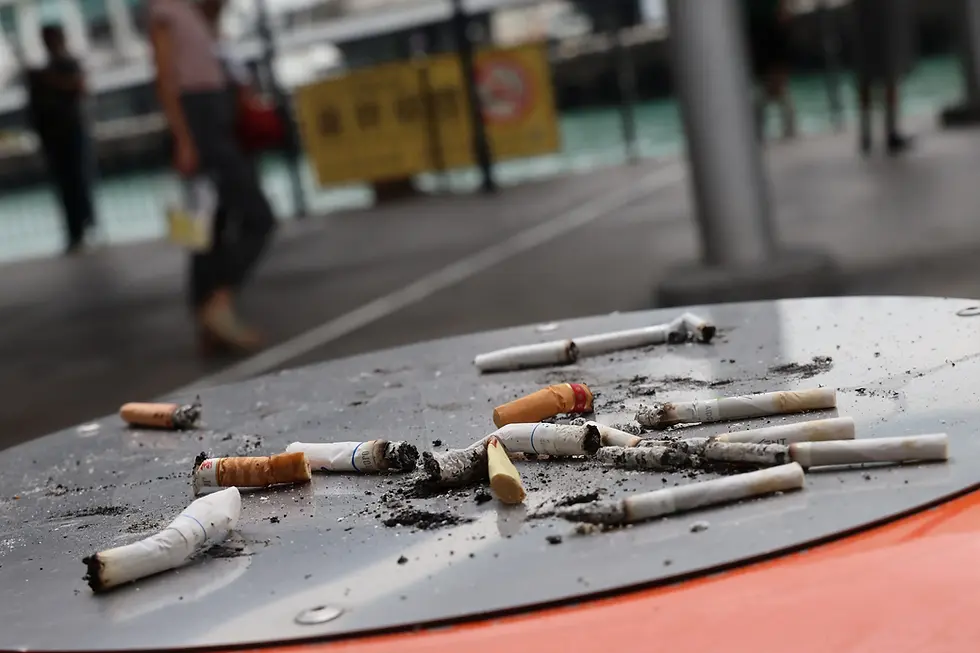No ifs, ands, or Butts: Cigarette Littering Needs to Stop.
- James Marlow-Smith

- May 19, 2025
- 3 min read
Updated: Jun 8, 2025
As a resident of Hong Kong for almost 9 years, I’ve am still marvelled at the city’s vibrancy. From the neon-lit streets of Mong Kok to the serene harbourside promenades, and the bustling MTR stations. Yet, there’s an unsightly blight that plagues this urban landscape: cigarette butts.
From flicked butts in flower beds to people confidently throwing them into gutters, the problem isn’t just aesthetic; it’s a ticking environmental, health, and economic crisis waiting to erupt.

Hong Kong’s cigarette litter epidemic is staggering. With over 7 million people packed into this concrete jungle, smoking rates remain stubbornly high, particularly among men (nearly 30% smoke daily). While designated smoking zones exist, you wouldn't be blamed for not knowing so given how many people flout these rules, smoking in bus shelters, in areas with others around, and then proceeding to discard the butts wherever they please. I’ve seen pedestrians toss cigarettes into roadside drains so much, it's clear it's become a habit so normalised it’s almost reflexive. But these actions have dire consequences.
Cigarette butts are the most littered item globally, with estimates of up to 4.5 trillion per year according to the WHO, and Hong Kong is no exception to this. Each butt contains non-biodegradable cellulose acetate, leaching toxins like arsenic, lead, and formaldehyde into our environment. When rain washes them into drains, they flow directly into Victoria Harbour and the South China Sea. Studies show a single butt can poison marine life in a litre of water. Imagine the cumulative effect of millions of butts choking our waters annually.
The risks extend beyond pollution. Lit cigarettes in dry vegetation or clogged gutters are fire hazards - a grave threat in a city prone to typhoons and flooding. Last December, a garbage truck in Tai Wai caught fire due to a ignited cigarette butts.
Health-wise, the toll is twofold. Secondhand smoke from improperly extinguished cigarettes lingers in crowded alleys and public spaces, while toxic chemicals seep into soil and groundwater, tainting the very air and water we depend on. Economically, Hong Kong spends millions yearly on cleanup efforts and healthcare for smoking-related illnesses. Yet, the cost of inaction (damage to tourism, ecosystems, and public welfare) is far greater.
Culturally, cigarette litter reflects a troubling apathy. Despite fines for littering (up to HKD 1,500), enforcement is lax. Many smokers claim “it’s just one butt,” but collective negligence has turned our streets into ashtrays. This mindset undermines Hong Kong’s image as a world-class city.
Change begins with accountability. Stricter enforcement, more public ashtrays, and education campaigns are vital. As a society, we must challenge the normalisation of littering—whether through community cleanups or simply refusing to look away when we see a butt on the ground. Smokers can carry portable ashtrays; businesses can provide disposal bins. Every small act matters.
Hong Kong’s beauty lies in its contrasts—skyscrapers beside green hills, tradition meeting modernity. But to preserve this balance, we must confront the invisible threat in our midst. Sure, it’s easy to toss it anywhere, but this mess hurts everyone. Smokers, stub it out properly. Everyone else, pick one up if you see it. Hong Kong’s too iconic to let trash ruin it. Keep the city clean. Don’t let today's negligence fuel tomorrow’s disaster.










